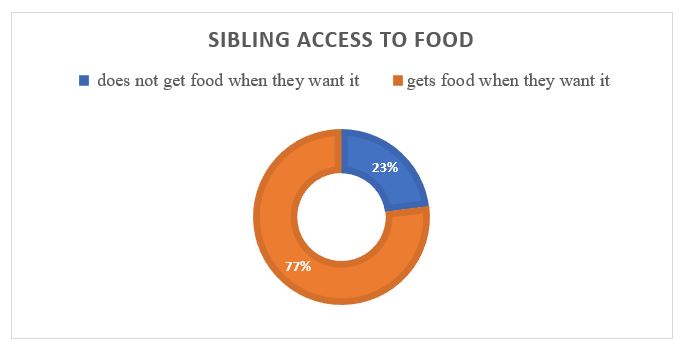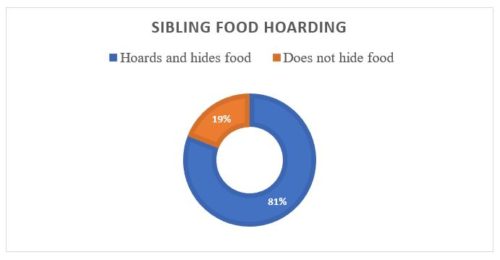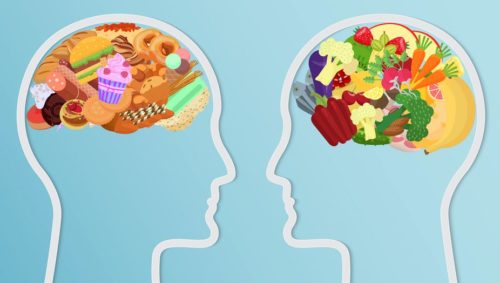Food restrictions in the home, although necessary for the safety and health of the family member with Prader-Willi Syndrome (PWS), can negatively impact siblings. The constant need to  lock food adds intense stress and worry to siblings on several levels. For example, if the sibling forgets to lock access to food, this could result in a scolding from other family members or even the death of the member with PWS. This is an incredible burden for children to carry. Further, siblings are often not given free access to food in the home and must eat with their sibling with PWS or sneak their meals when the sibling is preoccupied. Siblings often go hungry because of this lack of access, which is an added stressor and another avenue of suffering (Murphy, Thornton & Thornton, 2019).
lock food adds intense stress and worry to siblings on several levels. For example, if the sibling forgets to lock access to food, this could result in a scolding from other family members or even the death of the member with PWS. This is an incredible burden for children to carry. Further, siblings are often not given free access to food in the home and must eat with their sibling with PWS or sneak their meals when the sibling is preoccupied. Siblings often go hungry because of this lack of access, which is an added stressor and another avenue of suffering (Murphy, Thornton & Thornton, 2019).
Research shows that rigidity and strictness in the home is a risk factor that can negatively impact the well-being of siblings. However, organization in the home and family is a protective factor that can shield siblings from some of the negative impacts of having a family member with PWS (Murphy, Thornton & Thornton, 2019). Refusing access to food for siblings and punishing normal childhood behaviors such as forgetting to lock a pantry, fosters fear, avoidance, and other negative emotional and psychological impacts. Parents that provide appropriate access to food for siblings, while controlling the food intake of the family member with PWS, show organization and provide the necessary food and environmental stability to protect siblings.

Some Ideas
- Instead of being strict, panicked, and overly cautious over food, be organized. Try to talk about food calmly and give the sense that you have the situation handled. Do not significantly limit siblings’ access to food in attempt to control the food consumption of your child with PWS.
- Give your children without PWS access to the food (give them the key or access code). Try to give siblings as much control over their environment as possible.
- If siblings are not old enough or mature enough to have free access to the food, make sure they feel comfortable asking you for access and open the food for them when they come home or after a couple hours of not having access.
- Give siblings a safe or locked drawer where they can have free access to food. Also, give the siblings a lock on their bedroom door so they can eat snacks in peace.
- Consider feeding the child with PWS earlier and get them onto the next activity and then feed your other children so the meal can be less stressful, and seconds can be freely consumed.
- Take the locks off the food before the child with PWS wakes up, after they go to bed, or when they are out of the house and let siblings have free access.
- Take siblings out to eat without the child with PWS. Many siblings reported wanting to go to a buffet because they are rarely able to eat freely (Murphy, Thornton & Thornton, 2019).
- Install cameras in your kitchen so you can see when the food is left unlocked or when your child with PWS is in the kitchen. Some cameras will even alert you when someone goes into the kitchen so you can better monitor the food.
- Avoid chastising siblings for leaving the food unlocked. Often, they already feel extremely guilty knowing that leaving the food unlocked could have injured or killed their sibling. Instead of yelling, calmly remind them of the importance and try to come up with a better way for them to remember. For instance, place a sign near the exit of the kitchen as a reminder to lock the food. You might even have them place a sticker on the sign each time they lock the food up as a more tangible reminder.
- If you do get overly angry and yell at siblings when they leave the food unlocked, make sure you apologize.
- Link to helpful article on apologizing: https://www.psychologytoday.com/us/blog/peaceful-parents-happy-kids/201706/how-and-when-apologize-your-child
- Talk to your kids often about the difficulties of locking up food. Discuss their experiences and emotions and work with them to create a plan of how to better handle food. Include them in the process. Do not impose rules upon siblings. Give them more control over their environment.
References
Joyce, C., & Delaney, D. (2010). Child Neglect and Food Hoarding. Food In Care. https://www.fosterparentcollege.com/info/connections/Connections-100110.pdf
Murphy, L., Thornton, J., Thornton, E. (2019). Tips for Supporting Parents. Prader-Willi Syndrome Association (USA). Retrieved from: https://ww.pwsausa.org/2019convention handouts/
Contributed by Jane Thornton





 Perry A. Zirkel has written more than 1,500 publications on various aspects of school law, with an emphasis on legal issues in special education. He writes a regular column for NAESP’s Principal magazine and NASP’s Communiqué newsletter, and he did so previously for Phi Delta Kappan and Teaching Exceptional Children.
Perry A. Zirkel has written more than 1,500 publications on various aspects of school law, with an emphasis on legal issues in special education. He writes a regular column for NAESP’s Principal magazine and NASP’s Communiqué newsletter, and he did so previously for Phi Delta Kappan and Teaching Exceptional Children. Jennifer Bolander has been serving as a Special Education Specialist for PWSA (USA) since October of 2015. She is a graduate of John Carroll University and lives in Ohio with her husband Brad and daughters Kate (17), and Sophia (13) who was born with PWS.
Jennifer Bolander has been serving as a Special Education Specialist for PWSA (USA) since October of 2015. She is a graduate of John Carroll University and lives in Ohio with her husband Brad and daughters Kate (17), and Sophia (13) who was born with PWS. Dr. Amy McTighe is the PWS Program Manager and Inpatient Teacher at the Center for Prader-Willi Syndrome at the Children’s Institute of Pittsburgh. She graduated from Duquesne University receiving her Bachelor’s and Master’s degree in Education with a focus on elementary education, special education, and language arts.
Dr. Amy McTighe is the PWS Program Manager and Inpatient Teacher at the Center for Prader-Willi Syndrome at the Children’s Institute of Pittsburgh. She graduated from Duquesne University receiving her Bachelor’s and Master’s degree in Education with a focus on elementary education, special education, and language arts. Evan has worked with the Prader-Willi Syndrome Association (USA) since 2007 primarily as a Crisis Intervention and Family Support Counselor. Evans works with parents and schools to foster strong collaborative relationships and appropriate educational environments for students with PWS.
Evan has worked with the Prader-Willi Syndrome Association (USA) since 2007 primarily as a Crisis Intervention and Family Support Counselor. Evans works with parents and schools to foster strong collaborative relationships and appropriate educational environments for students with PWS. Staci Zimmerman works for Prader-Willi Syndrome Association of Colorado as an Individualized Education Program (IEP) consultant. Staci collaborates with the PWS multi-disciplinary clinic at the Children’s Hospital in Denver supporting families and school districts around the United States with their child’s Individual Educational Plan.
Staci Zimmerman works for Prader-Willi Syndrome Association of Colorado as an Individualized Education Program (IEP) consultant. Staci collaborates with the PWS multi-disciplinary clinic at the Children’s Hospital in Denver supporting families and school districts around the United States with their child’s Individual Educational Plan. Founded in 2001, SDLC is a non-profit legal services organization dedicated to protecting and advancing the legal rights of people with disabilities throughout the South. It partners with the Southern Poverty Law Center, Protection and Advocacy (P&A) programs, Legal Services Corporations (LSC) and disability organizations on major, systemic disability rights issues involving the Individuals with Disabilities Education Act (IDEA), Americans with Disabilities Act (ADA), and the federal Medicaid Act. Recently in November 2014, Jim retired.
Founded in 2001, SDLC is a non-profit legal services organization dedicated to protecting and advancing the legal rights of people with disabilities throughout the South. It partners with the Southern Poverty Law Center, Protection and Advocacy (P&A) programs, Legal Services Corporations (LSC) and disability organizations on major, systemic disability rights issues involving the Individuals with Disabilities Education Act (IDEA), Americans with Disabilities Act (ADA), and the federal Medicaid Act. Recently in November 2014, Jim retired.